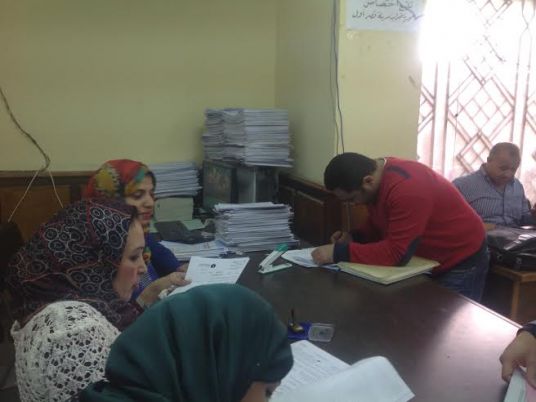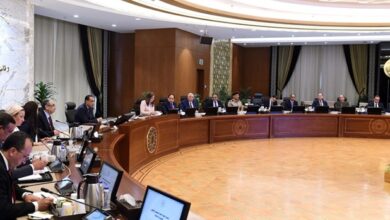The Muslim Brotherhood’s mouthpiece paper continues its war against privately-owned newspapers and TV channels with a two-page exposé Thursday labeling them “black media.” Freedom and Justice mentions almost every satellite television channel available in Egypt, including Dream TV, ONTV, Al-Hayat and CBC, highlighting the ties of their respective owners with the old regime and accusing them of seeking to thwart the revolution and spreading rumors about Islamists.
“These channels and newspapers present some hosts and journalists who belonged to the disbanded National Democratic Party in a new shape in order to pave the way for the reproduction of the old regime,” reads the paper. “[These media] stress the disadvantages of the revolution and black out its achievements by distorting the image of elected institutions,” continued the report in reference to the dissolved Parliament and the presidency.
The paper quotes Islamist writer Ragheb al-Sergany urging the president to issue legislation that would “criminalize lies and the spreading of rumors through the media.” He also says reforming the industry will be President Mohamed Morsy's biggest challenge.
In contrast, the paper also proposes the category of “the white media,” which encompasses outlets that “seek to complete the goals of the revolution, endorse the [Muslim Brotherhood’s] Renaissance Project and fight corruption.”
The report hails privately owned Youm7 newspaper for having confirmed reports that Morsy won the election before the final results were announced.
“Some newspapers are trying to put themselves on the right track. Some newspapers have already changed their leanings, performance and language,” writes Freedom and Justice.
Egypt Independent sister paper Al-Masry Al-Youm is also one of the publications hailed in this report for changing its editorial policy after the resignation of Editor-in-Chief Magdi el-Gallad. Freedom and Justice also contends that state-owned media has begun adopting some corrective measures.
The Muslim Brotherhood’s position on the media is drawing much attention this week in light of ongoing editor elections for the state-owned newspapers. These elections are regulated by the Shura Council once controlled by the NDP and now dominated by the Brotherhood. Many journalists have protested council oversight, contending that it allows Egypt's rulers to use state papers as mouthpieces.
Private Al-Shorouk daily quotes anonymous sources as saying that the election winners will be members of the Muslim Brotherhood or journalists known for their ties with the nation’s oldest Islamist organization.
On its front page, the same paper highlights an alleged agreement between the Brotherhood and the Supreme Council of the Armed Forces to hack up the Cabinet. As usual, the paper quotes anonymous sources in its report that they will divide four “sovereign” ministries, with the generals picking the interior and defense ministers and the Brotherhood the justice and foreign ministers.
Salafis and the Brothers are fighting over service-based ministries, including the health, education, higher education, finance and agriculture posts, adds Al-Shorouk. The paper again quotes anonymous sources, this time within the Brotherhood’s Freedom and Justice Party, as saying that reform leader Mohamed ElBaradei has rejected an offer to become prime minister. “But this rejection was not final,” adds the paper.
State-owned Al-Akhbar quotes acting presidential spokesperson Yasser Ali as denying reports that ElBaradei was tasked with forming Morsy's Cabinet or that former presidential candidate Abdel Moneim Abouel Fotouh ,who came in fourth in the May race, has been appointed vice president.
State-owned Al-Ahram highlights on its front page an administrative court ruling on facial hair. The court upheld on Wednesday a decision by the interior minister to refer bearded policemen to a disciplinary board and fire them. The court ruled that these officers had violated appearance guidelines in the Police Authority Law, which require them to trim their hair and shave their beards, according to Al-Ahram.
Outside of personal grooming and media criticism, a debate is flaring up within the Constituent Assembly over the wording of Article 2 in the new constitution. While Salafis insist that the old article reading, “the principles of Islamic Sharia are the primary source of legislation” be changed to, “the commandments of Islamic Sharia,” FJP and liberal assembly members refuse to make any modifications.
Independent Al-Tahrir daily says that Salafi leaders met yesterday with Al-Azhar Grand Sheikh Ahmed al-Tayyeb, hoping to get his endorsement for the wording change. Tayyeb, who is known for his liberal understanding of Islam, refused to support their cause. After two hours of heated discussions, those at the meeting agreed that Al-Azhar would draft Article 2 under the condition that the final outcome would consider the views of different political forces.
Egypt’s papers:
Al-Ahram: Daily, state-run, largest distribution in Egypt
Al-Akhbar: Daily, state-run, second to Al-Ahram in institutional size
Al-Gomhurriya: Daily, state-run
Rose al-Youssef: Daily, state-run
Al-Dostour: Daily, privately owned
Al-Shorouk: Daily, privately owned
Al-Watan: Daily, privately owned
Al-Wafd: Daily, published by the liberal Wafd Party
Youm7: Daily, privately owned
Al-Tahrir: Daily, privately owned
Freedom and Justice: Daily, published by the Muslim Brotherhood's Freedom and Justice Party
Sawt al-Umma: Weekly, privately owned
Al-Arabi: Weekly, published by the Nasserist Party
Al-Nour: Official paper of the Salafi Nour Party




